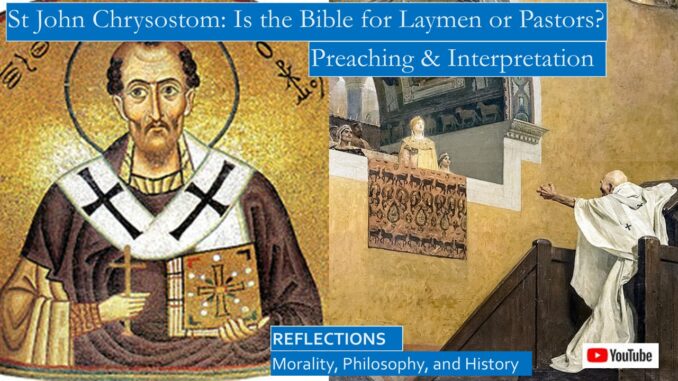
Why should laymen read the Scriptures? Isn’t that the job of pastors and priests?
How did St John’s knowledge of Stoicism influence his Christianity?
How does St Augustine say we should read the Scriptures?
Should Christians avoid attending chariot races? How about football games?
ST JOHN CHRYSOSTOM ON READING SCRIPTURES
In his sermons on the Parable of Lazarus and the Rich Man, St John Chrysostom also reflects on why the Scriptures are more beneficial to ponder for laymen than for the clergy, on whether Christians should attend the chariot races, and discusses other parables and biblical narratives.
In the style of the Roman Stoic Philosophers Epictetus and Musonius Rufus, St John Chrysostom upbraids his flock on how those who struggle to make a living and raise a family need to study Scriptures more than those monks praying in monasteries in the mountains.
Epictetus, Stoic Philosopher
http://www.seekingvirtueandwisdom.com/epictetus-discourses-blog-1/
http://www.seekingvirtueandwisdom.com/epictetus-discourses-blog-2/
https://youtu.be/Dhd543kov-E
Musonius Rufus on Exile
http://www.seekingvirtueandwisdom.com/musonius-rufus-on-exile/
Musonius Rufus, Stoic Philosopher, Forgiveness and Obedience
http://www.seekingvirtueandwisdom.com/musonius-rufus-stoic-philosopher-forgiveness-and-obedience/
Stoic Musonius Rufus on Forgiveness, Obedience, Exile, and Living a Philosophical Life
https://youtu.be/2Ft0YOjfbP8
Musonius Rufus on Concupiscence and Controlling the Appetites
http://www.seekingvirtueandwisdom.com/musonius-rufus-on-concupiscence-and-controlling-the-appetites/
St Augustine on Concupiscence, Blogs 1, 2 & 3
https://seekingvirtueandwisdom.com/st-augustine-on-concupiscence-blog-1/
https://seekingvirtueandwisdom.com/st-augustine-on-concupiscence-blog-2/
https://seekingvirtueandwisdom.com/st-augustine-on-concupiscence-blog-3-final-reflections/
St Augustine, Stoic Musonius Rufus, & Ruth on Concupiscence: Love or Lust? Controlling the Passions
https://youtu.be/-wv6bVeG74A
Major Roman Stoic Philosophers, My Favorite Maxims: Epictetus, Rufus, Seneca & Marcus Aurelius
https://seekingvirtueandwisdom.com/major-roman-stoic-philosophers-my-favorite-maxims-epictetus-rufus-seneca-marcus-aurelius/
https://youtu.be/E0qQgqGkoOE
St John Chrysostom is emphatic: “Do not let any say to me those vain words, worthy of heavy condemnation: ‘I cannot leave the courthouse, I administer the business of the city, I have a craft, I have a wife, I am raising children, I am in charge of a household, I am a man of the world; reading the Scriptures is not for me, but for those who have been set apart, who have settled on the mountaintops, who keep this way of life continuously.’”
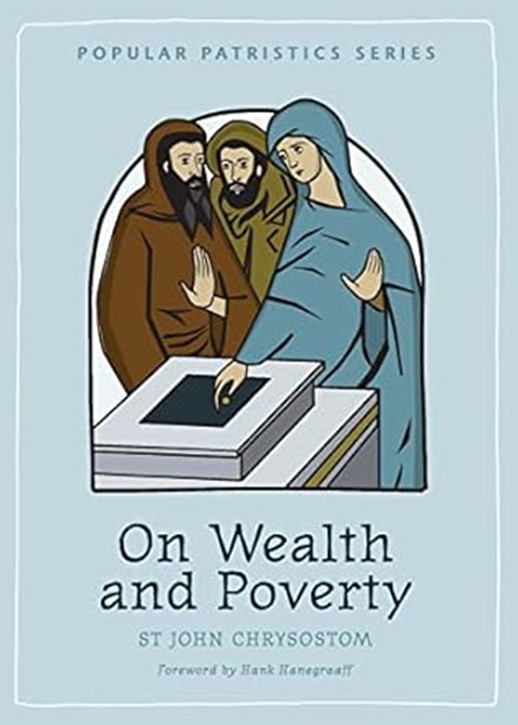
St John Chrysostom asks: “What are you saying, man? That attending to the Scriptures is not for you, since you are surrounded by a multitude of cares? Rather it is for you more than them. Monks do not need the help of the divine Scriptures as much as those who are involved in many occupations. The monks, who are released from the clamor of the marketplace and have fixed their huts in the wilderness, who own nothing in common with anyone, but practice wisdom in the calm of that quiet life, as if resting in a harbor, enjoy great security; but we, as if tossing in the midst of the sea, are driven by a multitude of sins to the continuous aid of the Scriptures.”
St John Climacus, who wrote the monastic manual, the Ladder of Divine Ascent, likewise has wise words of wisdom for laymen seeking to live a godly life in the world. Saint John Climacus teaches us who are laymen:
“Some people living carelessly in the world have asked me:
‘We have wives and are beset with social cares, and how can we lead the solitary life?’
I replied to them: ‘Do all the good you can; do not speak evil of anyone; do not steal from anyone; do not lie to anyone; do not be arrogant to anyone; do not hate anyone; do not be absent from the Divine Services; be compassionate to the needy; do not offend anyone; do not wreck another man’s domestic happiness, and be content with what your own wives can give you. If you behave in this way, you will not be far from the Kingdom of Heaven.’”[1]
John Climacus: First Step of the Ladder of Divine Ascent
http://www.seekingvirtueandwisdom.com/st-john-climacus-first-step-on-the-ladder-of-divine-ascent/
https://youtu.be/Fco0W3bt5GA
St John Chrysostom observes: “The monks rest far from the battle, and so they do not receive many wounds; but you stand continuously in the front rank, and you receive continual blows. So, you need more remedies. Your wife provokes you, for example, your son grieves you, your servant angers you, your enemy plots against you, your friend envies you, your neighbor curses you, your fellow soldier trips you up, often a lawsuit threatens you, poverty troubles you, loss of your property gives you grief, prosperity puffs you up, misfortune depresses you, and many causes and compulsions to discouragement and grief, to conceit and desperation surround us on all sides, and a multitude of missiles falls from everywhere. Therefore, we have a continuous need for the full armor of the Scriptures.”
We are reminded by passages like this how life was so much more difficult for the ancient citizens of Constantinople than it is today for Americans. The prominent references to military combat underline the reality that you constantly feared external attack, and the mighty multiple thick walls of Constantinople withstood periodic sieges for centuries. Slaves and servants assumed the role of minimum wage employees today and were often part of the household. Without the relatively recent retirement plans of Social Security, the fear of poverty was ever pervasive. However, those who lived under the protection of the Roman Empire no longer had to worry, as did the ancient Greeks and Israelites, that an enemy city-state would conquer them, plunder everything, massacre the men, and enslave the women and children.
Ordinary Life for Romans Under Stoic Emperor Marcus Aurelius
https://seekingvirtueandwisdom.com/ordinary-life-for-romans-under-stoic-emperor-marcus-aurelius/
https://youtu.be/9hgSbcgbCJw
Ordinary Life and Justice in Ancient Athens, Rome, and Israel
http://www.seekingvirtueandwisdom.com/ordinary-life-and-justice-in-the-ancient-world/
https://youtu.be/vl8KGL5Yx2w
Ancient Warrior Culture, Concubines, and Slaves, Ancient Greece, Rome, and Israel
https://seekingvirtueandwisdom.com/ancient-warrior-societies-blog-1-the-warrior-ethos-of-ancient-greece/
https://youtu.be/7QAZ_s6zw4E
Ancient Warrior Societies, Blog 2, Greek and Roman Armies and Navies
https://seekingvirtueandwisdom.com/ancient-warrior-societies-blog-2-greek-and-roman-armies-and-navies/
Ancient Warrior Societies, Blog 3, World of the Old Testament
https://seekingvirtueandwisdom.com/ancient-warrior-societies-blog-3-world-of-the-old-testament/
Ancient Warfare in Ancient Greece, Rome, and Israel. Did Joshua Massacre Pagans in Promised Land?
https://youtu.be/9xKxqAbJ2qY
St John Chrysostom reminds us: “The designs of the flesh attack more fiercely those who live in the midst of the world. A handsome face and splendid body strikes us in the eyes; a shameful phrase piercing our ears troubles our mind; and the effeminate song weakens the tension of our soul.”
St John Chrysostom asks us: “Why am I saying this? That which often seems the slightest of all these attacks, the scent of perfume falling from courtesans as they pass somewhere nearby has captured and taken us away as prisoners by a mere accident. There are many things like these which besiege our souls: we need the divine medicines to heal the wounds which we have received and to protect us from” future temptations. “We must thoroughly quench the darts of the devil and beat them off by continual reading of the divine Scriptures.”[2]
WHO BENEFITS MOST FROM ST JOHN CHRYSOSTOM’S PREACHING?
When he was asked: “How do you help by preaching?” St John Chrysostom responded: “I help if anyone hears me. I do my duty: He who sows, sows. The sower went out to sow: some seeds fell beside the road, some on the rock, some among thorns, but some on good soil. Three parts perished and one was saved.” St John Chrysostom continues: “If not everyone listens, half will listen; if not half, a third; if not a third, a tenth; if not a tenth, if even one from the crowd listens, let him hear. It is not a small accomplishment for even one sheep to be saved, since that shepherd left the ninety-nine sheep and ran after the one which had strayed. I do not despise anyone; even if he is the only one, he is a human being, the living creature for whom God cares.”
At this point, in our video we show a painting of St John Chrysostom upbraiding Empress Eudoxia for her questionable behavior. Although the Byzantine Empire was a Christian empire, the emperors had absolute power, and she exiled our dear saint. St John Chrysostom passed away soon after.
St John Chrysostom asks: “Did you not hear that the Lord conversed with the Samaritan woman?” “He did not despise her because she was a Samaritan, but because she had a soul, He cared for her. He did not neglect her because she was loose like a harlot, but because she was going to be saved and had showed faith, she often benefited from His concern.”[3]
The Samaritan woman at the well is known in the Catholic and Orthodox Churches as St Photine. According to tradition, she brought many souls into the church. Her success as an evangelist drew the attention of Emperor Nero, who tortured her for her faith, martyring her by throwing her into a well.[4]
How does this compare to St Augustine’s teachings on the role of preaching and reading Scriptures? In his pivotal work On Christian Doctrine, or On Christian Teaching, St Augustine teaches us all Scriptures should be interpreted to increase our Love of God and love of our neighbor, and if any Scriptures do not appear to affirm this two-fold love, then that passage should be interpretted allegorically.
St Augustine: On Christian Teaching, aka On Christian Doctrine, How To Read Scripture
http://www.seekingvirtueandwisdom.com/st-augustine-on-christian-teaching-how-to-read-scripture/
https://youtu.be/uQCnAJMPoos
SHOULD CHRISTIANS ATTEND THE CHARIOT RACES?
According to our translator, “St John Chrysostom says that Christians who were seen at the chariot races set a bad example for recent converts. Besides, they were wasting time, and, above all, nullifying the work of spiritual training which they had undertaken in the church. Perhaps, like some people today, they were making sport a substitute for religion, with the zealous attachment to one charioteer or another.”[5]
St John Chrysostom is distressed by those Christians who attend the chariot races, “applauding the charioteers with an uncontrollable frenzy.” “They wrangle with one another, saying that one horse ran badly, another was tripped and fell. One person attaches himself to one charioteer, another to the other. They have no thought or memory of the words” they heard in church, “nor of the spiritual and awesome mysteries celebrated there; but like captives in the snares of the devil they spend the whole day at the races, surrendering themselves to the satanic spectacle, and shaming themselves before the Jews, the pagans, and those who wish to ridicule us.”[6]
The Jesuit America magazine recently printed an article that I thought I would never see, where they compared the youth sporting movement that blithely schedules Sunday morning youth sporting events to an alternate cult, an alternate religion.[7] They also printed many letters from readers responding to this article.[8]
What we may never see is an article questioning whether Christians should be avid football fans, since so many priests talk about football from the pulpit and in casual conversations.
ST AUGUSTINE ON CHRISTIANS WATCHING GLADIATORS FIGHT TO THE DEATH
When Constantine the Great built his capital city of Constantinople, his Coliseum did not feature gladiators, but rather sponsored chariot races. But although the Roman Empire was now a Christian empire, the Western Church and Rome still retained some barbaric pagan practices, including the spectacle of gladiators fighting to the death in the Coliseum.
In his Confessions, St Augustine describes a friend who became addicted to the spectacle of gladiators battling to the death in the arena.
St Augustine’s Confessions: Mother Monica, Concubine, Marriage, and Philosophy, Books 6 & 7
https://seekingvirtueandwisdom.com/st-augustines-confessions-mother-monica-concubine-marriage-and-philosophy-books-6-7/
https://youtu.be/AjGbBozIReY
St Augustine remembers that many in crowd, “when they arrived at the arena, saw that the place was seething with the lust for cruelty.” St Augustine continues, “When his friend saw the blood” drawn by the swords of the gladiators, “it was as though he drank a deep drought of savage passion. Instead of turning away, he fixed his eyes upon the scene and drank in all its frenzy, unaware of what he was doing. He reveled in the wickedness of the fighting and was drunk with the fascination of bloodshed. He was no longer the man who had come to the arena, but was simply one of the crowd, a fit companion for the friends who had brought him.”[9]
Is this comparable to us watching horror movies with gratuitous violence, or awful movies such as the Texas Chainsaw Massacre, or the Freddie Kruger Halloween movies? I must admit I am somewhat addicted to watching the Keanu Reeves John Wick clips on YouTube, what about the gun-fu battles where he slays bad guys by the dozens? He always gets shot himself, but only once, and miraculously heals on the run as he fights through the pain. True, nobody is actually murdered in these staged movies, but how can watching this stuff improve our soul?
DISCUSSING THE SOURCES
The sermons of St John Chrysostom were transcribed for our benefit, and are both readable and quotable. We learned of this compilation from Father Vassilios’ commentary on Step 16 of St John Climacus’ Ladder of Divine Ascent on Avarice. Father Vassilios also referenced the compilations of St Basil’s works in On Social Justice.
St John Climacus, Ladder of Divine Ascent, On Avarice and Non-Possessiveness, Steps 16 & 17
https://seekingvirtueandwisdom.com/st-john-climacus-ladder-of-divine-ascent-on-avarice-and-non-possessiveness-steps-16-17/
Was St Basil Woke? Basil the Great On Social Justice, Homily To the Rich Man
https://seekingvirtueandwisdom.com/st-basil-the-great-on-social-justice/
https://youtu.be/PT_I5IrZGzY
Was St Basil WOKE? St Basil the Great On Social Justice, Parable of the Rich Fool
https://seekingvirtueandwisdom.com/was-st-basil-woke-st-basil-the-great-on-social-justice-parable-of-the-rich-fool/
https://youtu.be/UDQIZ81VfsY
St Basil on Social Justice: Assisting the Poor During a Famine in a Roman Province
https://seekingvirtueandwisdom.com/st-basil-on-social-justice-assisting-the-poor-during-a-famine-in-a-roman-province/
https://youtu.be/c8YXs7y4RrU
[1] St John Climacus, Ladder of Divine Ascent (Boston: Holy Transfiguration Monastery, 1991, originally written 1100’s, translated by Colm Luibheid and Norman Russell), Step 1, Paragraph 21. P. 9.
[2] John Chrysostom, On Wealth and Poverty, translated by Catharine P Roth (Crestwood, NY: St Vladimir’s Seminary Press, 1999, originally 300s AD), Third Sermon on Lazarus and the Rich Man, pp. 58-59.
[3] John Chrysostom, On Wealth and Poverty, Fourth Sermon on Lazarus and the Rich Man, pp. 82-96.
[4] https://en.wikipedia.org/wiki/Samaritan_woman_at_the_well
[5] Catharine P Roth, Introduction to John Chrysostom, On Wealth and Poverty, p. 17.
[6] John Chrysostom, On Wealth and Poverty, Seventh Sermon on Lazarus and the Rich Man, pp. 125-126.
[7] https://www.americamagazine.org/faith/2025/01/13/youth-sports-catholic-rest-249675
[8] https://www.americamagazine.org/faith/2025/02/13/your-take-cult-youth-sports-249916
[9] St Augustine, Confessions, translated by RS Pine-Coffin (New York: Dorset Press, 1986, 1961, originally 400 AD), Book 6, Chapter 8, p. 122.

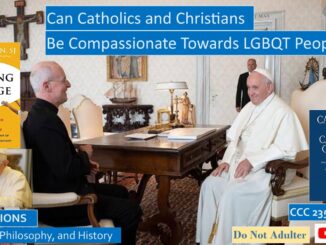
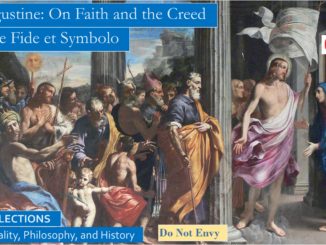
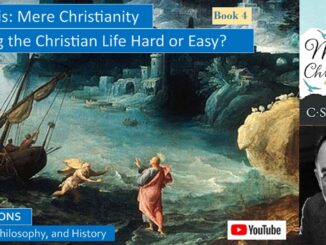
Be the first to comment